- Home
- David Downing
Silesian Station (2008) Page 27
Silesian Station (2008) Read online
Page 27
The GRU man took up the baton, asking Russell a series of questions about Mohlmann, almost none of which he could answer. Asked again how he'd met the man, he made up a chance encounter in a beer garden. Nazarov seemed less interested in Sarah Grostein, and Russell could understand why. She might provide access to higher decision-makers, but there was something shockingly urgent about trains heading your way full of troops and military vehicles.
And that was it. No new tasks were announced, promised or threatened. He would function as the cut-out between Sarah - now to be known as 'the violinist' - and Shchepkin; he would continue to transmit false information between the knowing Soviets and the unknowing Germans. There were only two bombs strapped around his life.
One last question, he said. If their government signed a non-aggression pact with the Nazis, how would that affect him?
Not at all, they said. No pact had been announced; and even if one should be, the Party had no illusions as to its permanence. Was Russell suggesting that they would betray comrades to the Nazis?
Of course not, Russell answered, recalling the list of German comrades - real or imaginary - which Borskaya had planted on him. It had taken more than one individual's 'keenness' to produce that. Still, he couldn't see any point in them betraying him again. He left the building feeling less than satisfied, but relieved that it hadn't been worse.
His driver took him on to the late morning press briefing, which proved an utter waste of time, but gave him the opportunity of joining his fellow journalists for lunch. The general opinion was that the trade agreement would be signed that afternoon, and the non-aggression pact in a week or so.
At the American Embassy he was given ten minutes with the press attache, who cheerfully told him that the Soviets had been warned - make a deal with the devil and he'll stab you in the back. At the devil's embassy they had nothing to say, but the smiles and smirks suggested bad news for Poland. He went back to the hotel, thought about decoding the NKVD's questions for the fake agent in Berlin, and decided he wasn't that curious.
He wrote a brief, doom-laden piece on the upcoming deal, and spent the next two hours traversing the bureaucratic hoops required to wire it. Another lonely dinner, another stroll in Red Square, and he returned to find a woman in his bed.
A naked one, as became apparent when she pulled back the sheet.
A present from the chaps in Room 303, he thought. And beautiful too.
He stood there stupidly for what was probably only a couple of seconds, caught between bodily desire and every other conscious impulse, of which loyalty to Effi and suspicion of spooks bearing gifts loomed largest.
She smiled at him and moved slightly, causing the bedsprings to squeak.
'No,' he said, turning his eyes in search of her clothes, and finding them neatly folded on the chair. He picked them up and passed them to her. 'Thank you, but no.'
Her smile turned into a shrug.
Two minutes later she was gone. Russell gazed out at the empty square, reliving the movement of her body in his mind's eye. 'You would have hated yourself in the morning,' he muttered to himself.
Sunday morning's press briefing was as short as the name implied. The Soviet spokesman announced the signing of an economic treaty with Germany on the previous evening, but refused to divulge any details or take questions on whether the economic agreement was the forerunner of a political pact. The assembled foreign press corps grumbled its way back out to the heat.
Russell decided that now was a good time to explore the new Metro. Descending into the depths at the Comintern station, he rode out to the far end of the original line, inspecting the stations as he went. On the way back he alighted at a couple, and spent the time between trains exploring the avant garde architecture. It was very impressive.
He emerged at Pushinskaya Station, and sought out a shaded bench in the square. A few people were out for a Sunday morning stroll, but the city seemed quiet, lost in its summer torpor. Stalin's revolution, Russell thought, was like the dog that didn't bark in the Sherlock Holmes story. What mattered was what wasn't there - there were no church bells on a Sunday morning, no advertising on trams and hoardings, no conspicuous wealth. All of which could be construed as signs of success, at the least as proof of survival. But something else was also missing, something that could only mean failure. There was no popular enthusiasm.
Where had it all gone? In 1924 this city had overflowed with young idealists from around the world, all drawn to the workers' state by its international sponsorship of justice and equality. Fifteen years on, and it was full of home-grown cynics. Somewhere along the way the hopes of something better had become the dread of something worse.
News of the forthcoming Pact seeped out over the next forty-eight hours, like blood from a heavily-bandaged wound. Monday morning's Pravda was full of praise for the already-announced economic agreement, and hinted at a future extension into the political realm. The Soviet spokesman at the morning's briefing refused to confirm any such intentions, but his tone said otherwise; and as the day progressed the foreign press corps slowly gathered in the Metropole Bar, rather in the manner of steamboat passengers waiting for the order to abandon ship. Mid-evening, one intrepid hack bearded a gloomy-looking member of the British negotiating team in a hotel toilet, and was told that a member of the Russian team had confirmed an imminent visit from Ribbentrop. In the early hours of the morning a short-wave listener at the American Embassy heard German radio make the official announcement, and quickly tipped off one of the American journalists. The Metropole Bar greeted the news with a cynical cheer, but the silence thereafter was more telling. The journalists began drifting off to their rooms, most of them looking every bit as depressed as Russell felt.
The official Soviet news agency Tass removed any lingering doubts on the following morning: Foreign Minister Ribbentrop would be arriving 'in the next few days' to sign a non-aggression pact. Russell and a fellow American journalist ran two members of the British negotiating team to ground in their hotel lift, and were blithely informed that the Anglo-French negotiations with the Soviets were still ongoing. Wishful thinking or blind idiocy, the two journalists asked each other in the foyer, before realizing it didn't matter.
So why stay in Moscow? Russell asked himself. It was bad enough sharing the same continent with Ribbentrop, let alone the same city. All the agencies would carry the official details of the signing - he'd be better off in Warsaw, seeing how the Poles reacted. Nearer to Berlin and home as well.
He wrote and sent off his story, and took the Metro up to Byelorusskaya Station to reserve a sleeper on the afternoon train. Back at the Metropole he noticed Connie Goldstein in a secluded corner of the bar.
'You made it,' Goldstein said.
'I've been here since Friday. And now I'm heading back to Warsaw. The phrase "all over but the shouting" seems applicable.'
'Yes, I suppose it is.' Goldstein capped his pen, closed the notebook he'd been writing in, and smiled up at him. 'Have you got an hour or so? I'd like to show you something.'
'Sure. What is it?'
'Wait and see.'
Goldstein led him outside and hailed one of the waiting 'taxis'. 'Khodynka airfield,' he told the NKVD driver in Russian.
Russell half-expected an argument - the taxis were usually reluctant to take foreign journalists beyond the invisible boundaries of the government district - but the driver made no objection. As they sped up an eerily empty Gorky Street, Goldstein chattered happily about returning to the States, and a new grandchild born earlier that year.
The trip to Khodynka only took twenty minutes, and Russell was astonished by what greeted them: the buildings of the small airfield, along with all available poles and stretches of fencing, were hung or emblazoned with swastikas. Either the Nazi flag had figured in the last five year-plan or every seam-stress in Moscow had been up all night stitching the damn things together.
'He's arriving tomorrow,' Goldstein said.
Russell didn't re
ply. He was dumbstruck by the sea of swastikas. Playing for time was one thing - communists the world over had come to accept the Bolsheviks' insistence that some degree of realpolitik was necessary to the survival of the workers' state. But this went way beyond any judicious trimming of sails. This felt more like self-abasement, more like gratuitous over-compensation. Like Judas turning up at the crucifixion and insisting on having his picture taken. Ribbentrop's ego would probably explode.
'This is where Nicholas II's coronation was held in 1884,' Goldstein observed. 'They didn't make enough souvenir mugs, and fourteen hundred people were trampled to death in the stampede.'
'Wonderful,' Russell muttered. 'Just wonderful.'
The journey back to Warsaw was slower than the journey out. The train clanked to halt after halt, occasionally at a barely-lit platform, most times in the middle of a seemingly endless plain. When dawn broke they were still on the Soviet side of the border, and the only breakfast came courtesy of a few enterprising peasant women, who approached the train at one of its interminable stops with scraps of bread and a few raw carrots. It was almost ten in the morning when their train rolled out of the Soviet Union through the gap in the barbed wire, and almost noon before their Polish train left the border station. It was faster than its Russian equivalent, but not by much, and the sun was low on the western horizon by the time it reached Warsaw.
Russell made sure that trains were still running into Germany, checked into a cheap hotel opposite the station, and took a taxi to the Europejski. Finding no fellow-journalists, he moved on to the Bristol, where several foreign correspondents were lined up at the bar. There had been no official announcement of a pact, he was told, but Ribbentrop had arrived in Moscow that morning, and everyone knew that an agreement was about to be signed.
There was one Pole in the party, an English-speaking journalist with one of the local dailies. He had obviously been drinking for a while, which both explained his belligerent attitude and facilitated its expression. 'The sooner the better,' he said, thumping his palm on the polished bar. 'While we still have allies,' he added pointedly, marching an accusative gaze down the row of English faces.
Out on the street Russell saw other Polish faces brimming with a similar bravado, the facial equivalent of the cavalry he had seen in Pidsulski Square. But there were also eyes dulled by resignation, or seemingly stunned that the moment had finally arrived. The Poles he spoke to in English had only one question - would England and France live up to their obligations? Yes, Russell told them, though part of him hoped the answer was no. If sacrificing Poland would keep his son out of a European war, he'd do it in a heartbeat. The trouble was, it wouldn't.
His hotel was quieter than expected, his bed more comfortable, but he still slept badly, hovering most of the night between waking and dreaming, fragments of his own war flickering harmlessly out of reach, like a silent movie through a curtain of gauze. He woke with the smell of the trenches in his nostrils and the old familiar feeling that this was the day he would die.
As he walked up Nowy OEwiat towards Pidsulski Square he scanned the faces of passers-by, and thought he saw something approaching relief. The Pact had been announced, he guessed, both in Moscow and here on the radio. The die was cast.
The Foreign Office Press Department spokesman confirmed as much. He added little of a specific nature, but resolutely refused to accept that Polish intransigence was in any way to blame for the country's new vulnerability. Germany and Russia had always been Poland's enemies, he insisted, and always would be. Poland would fight them both if she had to, hopefully in the company of her Western allies.
Back on the square, Russell felt a sudden overwhelming need to be home, and had to dissuade himself from taking an immediate cab to hotel and station. There was a train mid-afternoon, he told himself - time to write and wire off his piece. There was no need to hurry.
He wrote his impressions of Warsaw on the brink, and walked down to the Post Office. There was no wire traffic out through Germany, but the elderly clerk was aggressively confident of the route via Copenhagen. He and his fellow Poles were not surrounded, he seemed to be saying. The rest of the world was still within reach.
Russell checked out of his hotel, bought his ticket and lunched in the station restaurant. The concourse seemed unusually busy, with lots of children chasing each other around piles of luggage, but there was no hint of panic, despite the headlines announcing the Pact in the lunchtime editions. There was a photograph of Ribbentrop arriving at Khodynka, beaming for the Soviet cameras.
Russell's train failed to leave on time, raising fears that it might be cancelled, but the French wagons-lits eventually jerked into motion. He wondered how many more trips they would be taking across Europe, and where they would be stranded when the frontiers slammed shut.
Jewish Ballast
After Russell's train had stood for more than ten minutes in Berlin's Alexanderplatz Station, a voice over the loudspeakers announced that it would proceed no further. Those passengers travelling to a stop in western Berlin were invited to take the next train from the neighbouring Stadtbahn platform, and Russell seized the opportunity to call Effi from a public telephone.
'I knew it was you,' she said.
'I'll see you in about half an hour.'
'Wonderful.'
He replaced the receiver, surprised at the enormity of his relief. Someone in his subconscious had been more worried than he cared to admit.
He climbed up to the Stadtbahn platform, and stood watching for the lights of a westbound train. It was almost eleven, but the air was still warm and humid, with no hint of a breeze. The sky through the canopy opening was black and starless.
The train was almost empty, and Russell picked up an abandoned evening newspaper from one of the seats. 'German Farmhouses in Flames' the head-line screamed, above the all-too-familiar litany of grievances real, imagined and invented. He looked at the names of the villages and wondered whether their inhabitants knew of their new-found status as victims of the 'Polish archmadness'.
'It looks serious this time,' a man sitting opposite said, with a nod in the direction of the newspaper.
'Yes,' Russell agreed.
'But at least the Fuhrer is back in Berlin,' the man added hopefully.
Whoopee, Russell thought to himself.
The streets between Zoo Station and Effi's flat were empty, her porch mercifully devoid of loitering SD agents. She met him at the door with the sort of sweet, soft embrace that made going away worthwhile, and pulled him into the living room. 'Thank God you're back,' she said.
'Well...'
'Because it has to be tomorrow.'
Russell sunk into the sofa. 'What does?'
'Eyebrows, of course. There's going to be a war, isn't there?'
'Well...'
'So this could be our last chance. Things will change once the war begins.'
'True. But he may not come tomorrow.'
'He did last Friday.'
'What have...'
'I went to see. I didn't do anything. I got your message from Solly Bern-stein, but I just had to see. Don't worry, I was in disguise. I'm getting really good at the make-up. All he'd have seen was a fifty year-old spinster, but he didn't even look at me.'
'He didn't pick anyone up?'
'I don't know. I only stayed a few minutes because I was afraid I might do something stupid if he did. I should have stayed.'
'I'm glad you didn't.'
'I'm glad you're glad, but you do agree - tomorrow could be our last chance?'
'Yes, of course, but he may not pick anyone up tomorrow.'
'Oh yes he will. Me.'
'No, absolutely not. I knew you'd think of this eventually, but it won't work. Believe me, I've thought about it too. But follow it through. If you offer yourself as bait, and let him drive you off in his car, what happens then? I can follow, but if I get too close he'll spot me, and if I don't I might lose you. And if we're incredibly lucky, and neither of those things happe
ns, we're still left with a problem when we get wherever it is we're going. I could probably deal with Eyebrows - assuming he doesn't pull a gun, that is - but the chances are there'll be others. I can't see any way of making it work.'
She smiled at him. 'I can.'
Next morning he took the NKVD papers from his suitcase, kissed a half-awake Effi goodbye, and walked down to Zoo Station. He'd half-expected a thorough search at the Polish border, and the need for another emergency phone call to Hauptsturmfuhrer Hirth, but his suitcase hadn't even been opened. The border authorities had been far too busy strip-searching a large family of Poles returning to their German home.
He called the SD number from the station, and rather to his surprise was put straight through to the Hauptsturmfuhrer. When Russell suggested a lunchtime treff in the Tiergarten, an exasperated Hirth told him to leave the papers in reception at 102 Wilhelmstrasse and hung up. Russell replaced the receiver, wondering what had happened. Had the Nazi-Soviet Pact rendered his supposed intelligence irrelevant, or had Hirth and Co. drawn the conclusion that caution was no longer necessary? Did he care? Chances were he would find out eventually, and probably wish he hadn't.
The garden in front of the SD building was full of roses in bloom, all much too fragrant for their owners. Russell presented his Russian envelope to the usual blonde receptionist, feeling more like a postman than an agent. She put it to one side, and went back to her reading as if he'd already gone.
Out on Wilhelmstrasse he became aware of activity on the roofs - soldiers, for the most part. A coup? he asked himself, without any real conviction. War, more likely. Thin gun barrels were also silhouetted against the blue sky - for all the much-trumpeted prowess of the Luftwaffe the regime obviously shared Frau Heidegger's fear of air attacks. The street was full of people hurrying to and fro, almost feverishly it seemed, and the Wertheim at the intersection with Leipziger Strasse was unusually crowded, the faces of emerging women full of grim satisfaction at a job accomplished. The German hausfrau was stocking up.

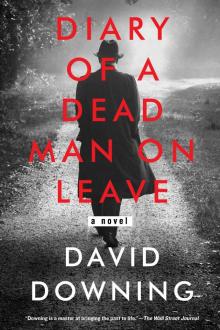 Diary of a Dead Man on Leave
Diary of a Dead Man on Leave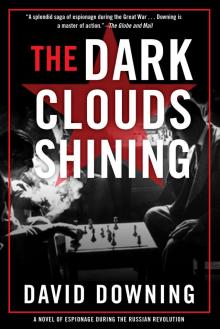 The Dark Clouds Shining
The Dark Clouds Shining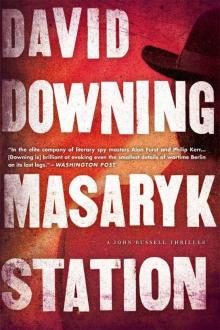 Masaryk Station (John Russell)
Masaryk Station (John Russell)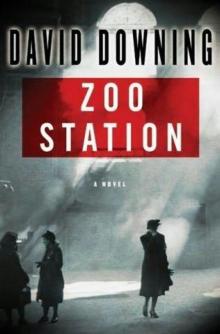 Zoo Stationee
Zoo Stationee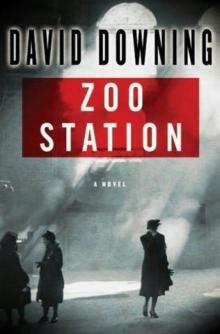 Zoo Station jr-1
Zoo Station jr-1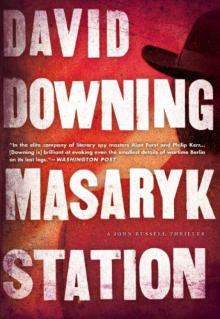 Masaryk Station
Masaryk Station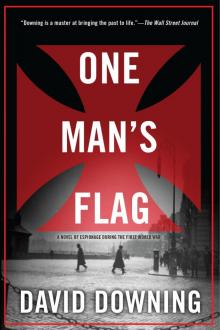 One Man's Flag
One Man's Flag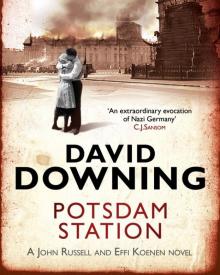 Potsdam Station jr-4
Potsdam Station jr-4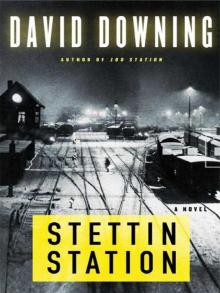 Stattin Station jr-3
Stattin Station jr-3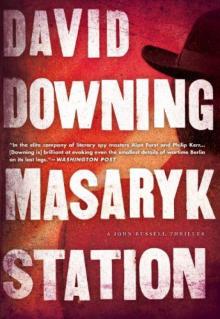 Masaryk Station jr-6
Masaryk Station jr-6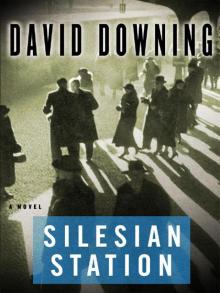 Silesian Station (2008) jr-2
Silesian Station (2008) jr-2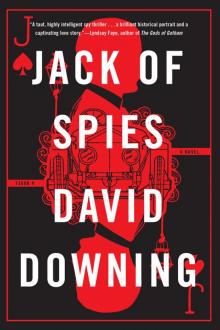 Jack of Spies
Jack of Spies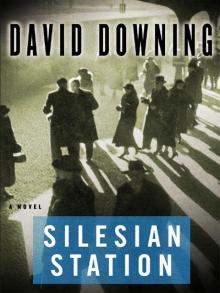 Silesian Station (2008)
Silesian Station (2008) The Moscow Option
The Moscow Option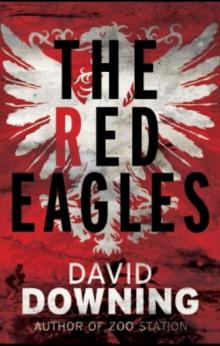 The Red Eagles
The Red Eagles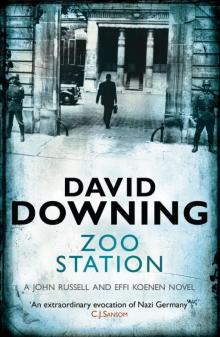 Zoo Station
Zoo Station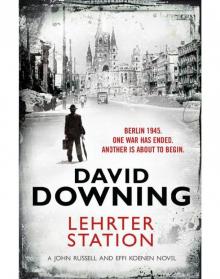 Lehrter Station
Lehrter Station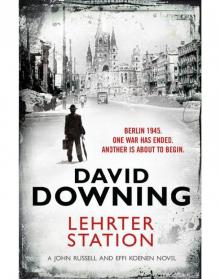 Lehrter Station jr-5
Lehrter Station jr-5